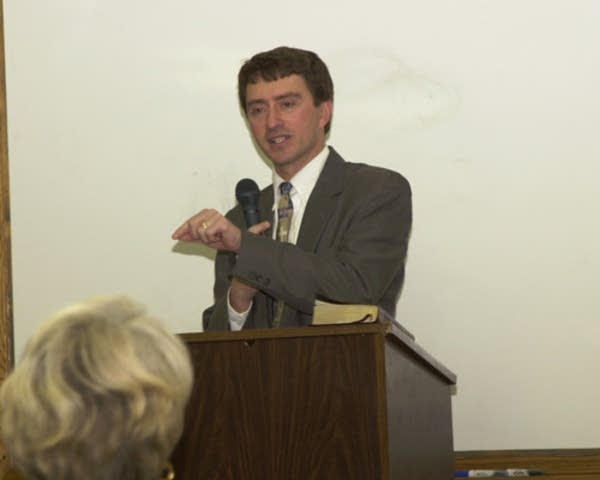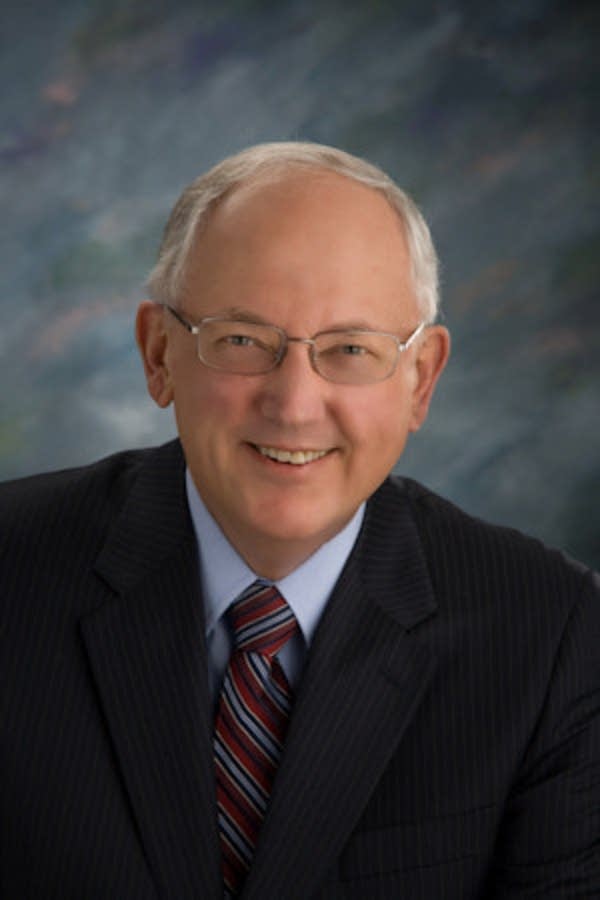Bemidji Magistrate challenges Supreme Court justice
Go Deeper.
Create an account or log in to save stories.
Like this?
Thanks for liking this story! We have added it to a list of your favorite stories.

Tim Tingelstad has served as a magistrate in Bemidji for the past nine years. Before that he was an administrative law judge for two years.
What sets Tingelstad apart is his view of religion and the law. He says the rule of law is not based on the opinion of seven men or women on a Supreme Court panel. He says it's something above and beyond that requires absolute truth just as religion does.
"Everyone has an opinion or belief as to where absolute truth is and where it comes from, and that's what I'm telling people where I believe my rock solid foundation is," Tingelstad says. "I believe that absolute truth exists and that it comes from God."
Tingelstad's opponent, Justice Paul Anderson disagrees.
Turn Up Your Support
MPR News helps you turn down the noise and build shared understanding. Turn up your support for this public resource and keep trusted journalism accessible to all.
"The danger in that approach is most of us see God in a slightly different way," Anderson says. "So it's a real danger for me to say my vision of God is what I'm going to enforce in the legal setting."

Anderson believes in a strict separation between church and state in performing his judicial duties. He says it would be wrong for him to bring his own particular vision of God to the courts.
He says it is valid for the public to look at his personal background--that he's active in his Presbyterian church-- but he says the public should not ask him to bring his religious views to the bench and decide cases based on them.
Tingelstad contends, however, that all judges bring some kind of a religious or non-religious view to the bench, and that it's more dangerous not to know what it is.
"If you know it you can decide whether you want to vote for him or her," he says. "If you don't know it, then you'll just wait and find out when they make their decisions." Anderson says the public should keep him office because he is the type of justice it wants. He says the public can look to what's been written about him, his rulings, and what attorneys say about him. Anderson says he's fair, impartial and adheres to the rule of law.
I believe that absolute truth exists and that it comes from God.
"When I make decisions, I'm open-minded, I take the facts, I take the law, tear each apart, put them together and let the facts and the law drive the result. That's the way it should be with a judge," says Anderson.
The Minnesota Supreme Court not only decides cases but also is involved in managing the state's court system.
The chief justice sets the tone for the courts by convening task forces on issues such as racial disparities in the legal system. One issue that previous Chief Justice Russell Anderson championed was eliminating contested elections for judges.
It's an issue where Tingelstad and Paul Anderson have some differences. Right now, most judges and justices are appointed by the governor and then they must run later in an election.
Sometimes, as in this race, the incumbent faces a challenger. Under the proposed change, the public would vote yes or no on whether a judge should remain in office. Tingelstad opposes the change.
"An election is the act of selecting one or more from others," he says. "These retention elections don't even include a second candidate so they're not an election. If we would ever give up the constitutional right to judicial elections we will still have the partisan politics."
Anderson says his view on the issue is more nuanced. He says he has always favored an election system for judges but as he looks to the horizon he's worried. That worry stems from a recent U.S. Supreme Court decision that allows judicial candidates to speak openly about their political and judicial views.
Since then, political action committees have started pouring money into judicial campaigns in other states--not Minnesota. The fear is that if elected those judges will be beholden to those interests and lose their impartiality on the bench.
Anderson says he's inching towards changing the system but has only tepid support for it.
"Pushed in a corner, I've seen the future and it doesn't look good and that would lead me to a reluctant support to do something in the near future," he says. "And qualify it to an extent that system may work better with your appellate judges."
Anderson says he's cautious and would see how it works with the appellate judges before changing the district judge elections.
Tingelstad says if the proposed changes were in place now, he would've had no chance at challenging a state Supreme Court justice. He ran unsuccessfully against Justice Alan Page four years ago.




